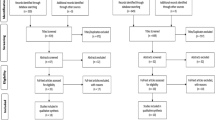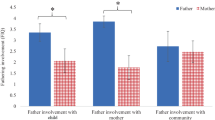Abstract
This study examined the longitudinal association between fathers’ early involvement in routine caregiving, literacy, play, and responsive caregiving activities at 9 months and maternal depressive symptoms at 4 years. Data for 3,550 children and their biological parents were drawn from the Early Childhood Longitudinal Study-Birth Cohort data set. Analyses in a structural equation modeling framework examined whether the association between father involvement and maternal depressive symptoms differed for families of children with autism spectrum disorder (ASD) and for families of children with other disabilities or delays from families of children who were typically developing. Results indicated that father literacy and responsive caregiving involvement were associated with lower levels of depressive symptoms for mothers of children with ASD. These findings indicate that greater father involvement may benefit families of children with ASD and highlight the need to support and encourage service providers to work with fathers.



Similar content being viewed by others
Notes
Per NCES requirements when using ECLS-B data, all N’s in this article were rounded to the nearest 50.
References
Risdal, D., & Singer, G. H. S. (2004). Marital adjustment in parents of children with disabilities: A historical review and meta-analysis. Research and Practice for Persons with Severe Disabilities, 29(2), 95–103.
Seligman, M., & Darling, R. B. (2007). Ordinary families, special children: A systems approach to childhood disability (3rd ed.). New York: Guilford Press.
Hastings, R., Kovshoff, H., Ward, N., Espinosa, F., Brown, T., & Remington, B. (2005). Systems analysis of stress and positive perceptions in mothers and fathers of pre-school children with autism. Journal of Autism and Developmental Disorders, 35(5), 635–644. doi:10.1007/s10803-005-0007-8.
Herring, S., Gray, K., Taffe, J., Tonge, B., Sweeney, D., & Einfeld, S. (2006). Behaviour and emotional problems in toddlers with pervasive developmental disorders and developmental delay: Associations with parental mental health and family functioning. Journal of Intellectual Disability Research, 50(Pt 12), 874–882.
Jeans, L. M., Santos, R. M., Laxman, D. J., McBride, B. A., & Dyer, W. J. (2013). Examining ECLS-B: Maternal stress and depressive symptoms when raising children with ASD. Topics in Early Childhood Special Education, 33(3), 162–171.
Estes, A., Munson, J., Dawson, G., Koehler, E., Zhou, X.-H., & Abbott, R. (2009). Parenting stress and psychological functioning among mothers of preschool children with autism and developmental delay. Autism, 13(4), 375–387.
Olsson, M. B., & Hwang, C. P. (2001). Depression in mothers and fathers of children with intellectual disability. Journal of Intellectual Disability Research, 45(Pt 6), 535–543.
Boyd, B. A. (2002). Examining the relationship between stress and lack of social support in mothers of children with autism. Focus on Autism and Other Developmental Disabilities, 17(4), 208–215.
Feldman, M., McDonald, L., Serbin, L., Stack, D., Secco, M. L., & Yu, C. T. (2007). Predictors of depressive symptoms in primary caregivers of young children with or at risk for developmental delay. Journal of Intellectual Disability Research, 51(Pt 8), 606–619.
Raina, P., O’Donnell, M., Rosenbaum, P., Brehaut, J., Walter, S. D., Russell, D., et al. (2005). The health and well-being of caregivers of children with cerebral palsy. Pediatrics, 115(6), e626–e636.
Brown, G. L., McBride, B. A., Shin, N., & Bost, K. K. (2007). Parenting predictors of father-child attachment security: Interactive effects of father involvement and fathering quality. Fathering, 5(3), 197–219.
McBride, B., Schoppe-Sullivan, S. J., & Ho, M.-H. (2005). The mediating role of fathers’ school involvement on student achievement. Journal of Applied Developmental Psychology, 26(2), 201–216.
Dyson, L. L. (1997). Fathers and mothers of school-age children with developmental disabilities: Parental stress, family functioning, and social support. American Journal on Mental Retardation, 102(3), 267–279.
Saloviita, T., Italinna, M., & Leinonen, E. (2003). Explaining the parental stress of fathers and mothers caring for a child with intellectual disability: A double ABCX model. Journal of Intellectual Disability Research, 47(4–5), 300–312.
Simmerman, S., Blacher, J., & Baker, B. L. (2001). Fathers’ and mothers’ perceptions of father involvement in families with young children with a disability. Journal of Intellectual and Developmental Disability, 26(4), 325–338.
Pleck, J. H. (2010). Paternal involvement: Revised conceptualization and theoretical linkages with child outcomes. In M. E. Lamb (Ed.), The role of the father in child development (5th ed., pp. 58–93). Hoboken: Wiley.
Lamb, M., Pleck, J., Charnov, E., & Levine, J. (1985). Paternal behavior in humans. American Zoologist, 25(3), 883–894.
Lancaster, C. A., Gold, K. J., Flynn, H. A., Yoo, H., Marcus, S. M., & Davis, M. M. (2010). Risk factors for depressive symptoms during pregnancy: A systematic review. American Journal of Obstetrics and Gynecology, 202(1), 5–14.
Paulson, J. F., & Bazemore, S. D. (2010). Prenatal and postpartum depression in fathers and its association with maternal depression: A meta-analysis. JAMA, 303(19), 1961–1969.
Snow, K., Derecho, A., Wheeless, S., Lennon, J., Rosen, J., Rogers, J., et al. (2009). Early childhood longitudinal study, birth cohort (ECLS-B), kindergarten 2006 and 2007 data file user’s manual (2010–010). Washington, DC: National Center for Education Statistics, Institute of Education Sciences, U.S. Department of Education.
Radloff, L. S. (1977). The CES-D scale: A self-report depression scale for research in the general population. Applied Psychological Measurement, 1(3), 385–401.
Poulin, C., Hand, D., & Boudreau, B. (2005). Validity of a 12-item version of the CES-D used in the national longitudinal study of children and youth. Chronic Diseases in Canada, 26(2–3), 65–72.
Acock, A. C. (2005). Working with missing values. Journal of Marriage and Family, 67(4), 1012–1028.
Vandenberg, R. J., & Lance, C. E. (2000). A review and synthesis of the measurement invariance literature: Suggestions, practices, and recommendations for organizational research. Organizational Research Methods, 3(1), 4–70. doi:10.1177/109442810031002.
Meredith, W. (1993). Measurement invariance, factor analysis and factorial invariance. Psychometrika, 58(4), 525–543. doi:10.1007/BF02294825.
Widaman, K. F., & Reise, S. P. (1997). Exploring the measurement invariance of psychological instruments: Applications in the substance abuse domain. In K. J. Bryant (Ed.), Alcohol and substance use research (pp. 281–324). Washington, DC: American Psychological Association.
Aiken, L. S., & West, S. G. (1991). Multiple regression: Testing and interpreting interactions. Newbury Park: Sage.
Zwaigenbaum, L., Bryson, S., Rogers, T., Roberts, W., Brian, J., & Szatmari, P. (2005). Behavioral manifestations of autism in the first year of life. International Journal of Developmental Neuroscience, 23(2–3), 143–152.
Davis, N. O., & Carter, A. S. (2008). Parenting stress in mothers and fathers of toddlers with autism spectrum disorders: Associations with child characteristics. Journal of Autism and Developmental Disorders, 38(7), 1278–1291.
Bebko, J. M., Konstantareas, M. M., & Springer, J. (1987). Parent and professional evaluations of family stress associated with characteristics of autism. Journal of Autism and Developmental Disorders, 17(4), 565–576.
Jeans, L. M., Santos, R. M., Laxman, D. J., McBride, B. A., & Dyer, W. J. (2013). Early identifiers of autism spectrum disorders in young children using a nationally representative dataset. Journal of Early Intervention, 35(4), 303–331.
Trivette, C. M., Dunst, C. J., & Hamby, D. W. (2010). Influences of family-systems intervention practices on parent-child interactions and child development. Topics in Early Childhood Special Education, 30(1), 3–19. doi:10.1177/0271121410364250.
Acknowledgments
This research was supported by a grant from the Institute for Education Sciences of the U.S. Department of Education to B. McBride, R. Santos, S. Hong, and W. J. Dyer (R324A120174). This research was also supported in part by the Eunice Kennedy Shriver National Institute of Child Health & Human Development of the National Institutes of Health under Award Numbers T32HD007489 and P30HD003352. The content is solely the responsibility of the authors and does not necessarily represent the official views of the Institute for Education Sciences or the National Institutes of Health.
Author information
Authors and Affiliations
Corresponding author
Rights and permissions
About this article
Cite this article
Laxman, D.J., McBride, B.A., Jeans, L.M. et al. Father Involvement and Maternal Depressive Symptoms in Families of Children with Disabilities or Delays. Matern Child Health J 19, 1078–1086 (2015). https://doi.org/10.1007/s10995-014-1608-7
Published:
Issue Date:
DOI: https://doi.org/10.1007/s10995-014-1608-7




